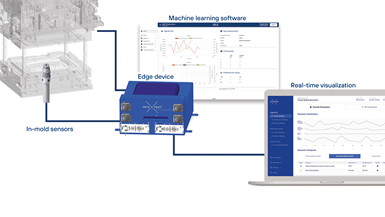In-Mold Sensor Technology Assists With Sustainability Goals
SensXpert Digital Mold from Netzsch Process Intelligence is intended to help the plastics industry reach governmental and environmental sustainability goals.

The SensXpert Digital Mold flow. Photo Credit: Netzsch Process Intelligence GmbH
The sensXPERT Digital Mold is a process control solution from Netzsch Process Intelligence GmbH to reach government and environmental sustainability practice goals in relation to resource-saving, circular plastics processing.
The intelligent sensor technology works alongside molding rigid plastics or elastomers and rubbers, neat, unreinforced polymers or composites, and with thermoplastic, thermoset or vitrimer matrices. It provides moment-by-moment in-mold materials characterization and process data to predict how evolving conditions inside and outside the mold are likely to affect the ultimate performance of parts.
The software implements a digital component tracking to achieve new levels of understanding and control over the molding process. Manufacturers are capable of moving quality assurance testing from downstream — where it is physically and temporally separate from the molding process — to inside the mold before parts are even ejected. sensXPERT is reported to achieve sustainable manufacturing through shorter cycle times, lower energy use and reduced scrap, while also providing a high level of transparency necessary for meeting European Union taxonomy reporting requirements. This is possible with the fully digital system presenting a complete digital thread for every product produced using the system.
Moreover, the sensXPERT Digital Mold dielectric sensors are able to determine crucial parameters related to temperature and pressure, which are decisive for the quality and resistance of the end product. The in-mold sensor data is processed using artificial intelligence (AI) based on 50 years of experience in basic materials science, reaction kinetic simulations and real manufacturing data.
Related Content
-
How to Use Scientific Maintenance for More Accurate Mold and Part Troubleshooting
Discover how adopting scientific maintenance approaches helps improve mold lifespan, minimize failures, and optimize production outcomes.
-
What is Scientific Maintenance? Part 2
Part two of this three-part series explains specific data that toolrooms must collect, analyze and use to truly advance to a scientific maintenance culture where you can measure real data and drive decisions.
-
What You Should Know About Injection Mold Safety Straps
Every mold should have one in order to be safe and OSHA compliant.












